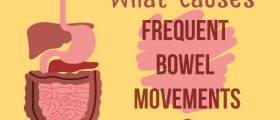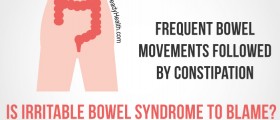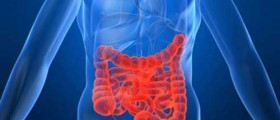
The intestines connect the anus with the stomach, and is made up of two sections - the large and small intestine. As for function, the small intestine deals with digestion and absorption of foods. The large intestine absorbs and eliminates waste. Food and waste are propelled through the intestine by movements known as peristaltic movements. If these movements are hampered, one might experience intestinal cramps.
Causes
One particularly unappealing cause of intestinal cramps is tapeworm infection. This infection occurs as a result of consumption of food that is contaminated by tapeworm eggs or larvae. Such infections are often accompanied by nausea, diarrhea and vomiting.
In some cases, constipation might lead to intestinal cramps. This condition causes a reduction in the frequency of passing stools. Constipation is caused by the excessive absorption of water from waste material in the intestines. This can slow down the peristaltic movements, thus decreasing elimination of stool and causing cramps.
Green stool is a condition that can cause intestinal cramps. This condition involves food passing more rapidly than necessary through the intestine. The main cause of this condition is diarrhea, and it can be identified by the greenness of stools. Some other potential causes of this include the use of laxatives, medicinal side effects, food poisoning and celiac disease. Crohn’s disease is a condition that leads to swelling in the digestive tract. This can lead to cramps, diarrhea, abdominal pain, blood in stools and malnutrition. This condition can be life threatening.
Irritable Bowel syndrome is another possible cause of cramps. This condition is normally indicated by the presence of abdominal pain in addition to the cramps. Other symptoms of this condition include mucus in stools, diarrhea, gas and stomach bloating. The main causes of IBS are stress, allergies, hormonal imbalance and diarrhea.
Treatment
Tapeworm treatment normally requires the administration of appropriate medication, such as praziquantel and nitazoxanide. Anti-inflammatory drugs liek Mesalamine, sulfasalazine and corticosteroids can be used to combat digestive tract swelling. These drugs also provide relief from intestinal cramps that are caused by Crohn’s Disease.
Laxatives can be used to counter the effects of constipation. High fiber foods and consumption of fluids can also provide relief from constipation. Cramps that occur because of IBS can be reduced through certain dietary changes. Eliminating goods such as soft drinks, cabbage, raw fruits and vegetables can also help reduce the symptoms and combat the underlying causes of irritable bowel syndrome.

















Your thoughts on this
Loading...